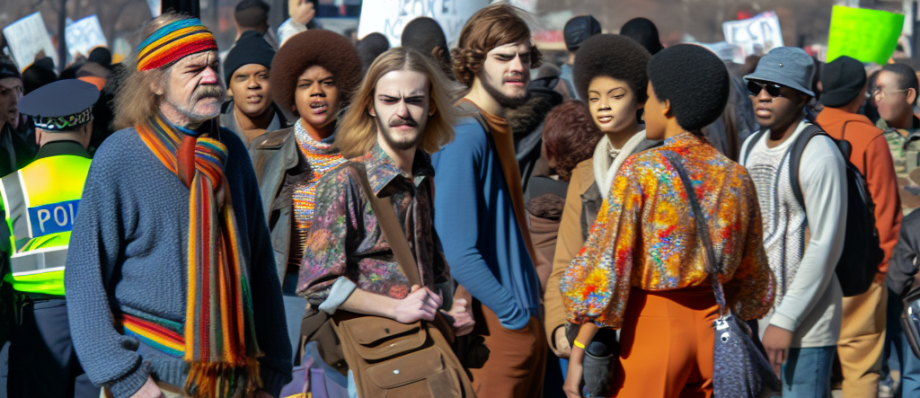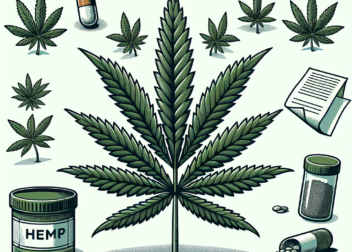The History of Marijuana in Chicago
- March 9, 2024
- Cannabis, Cannabis Laws in Chicago
- 9 mins read
The Rise of Marijuana Use in Chicago: A Historical Overview
Chicago, the third-largest city in the United States, has a rich history that spans over centuries. From its early days as a trading post to its current status as a bustling metropolis, Chicago has seen many changes and developments. One of the most significant changes in recent years has been the rise of marijuana use in the city. In this article, we will take a closer look at the history of marijuana in Chicago and how it has evolved over time.
The use of marijuana in Chicago can be traced back to the early 1900s when it was primarily used for medicinal purposes. During this time, marijuana was legal and could be purchased at pharmacies without a prescription. However, in the 1920s, the federal government passed the Marihuana Tax Act, which imposed heavy taxes on the sale and possession of marijuana. This led to a decline in its use and availability in Chicago.
In the 1960s, marijuana use saw a resurgence in Chicago, thanks to the counterculture movement and the rise of the hippie culture. The city became a hub for music, art, and activism, and marijuana was a common element in these circles. The use of marijuana was still illegal, but it was widely accepted and tolerated by law enforcement.
The 1970s saw a significant shift in the perception of marijuana in Chicago. The city was hit hard by the economic recession, and many people turned to drugs, including marijuana, as a means of escape. This led to an increase in crime and drug-related violence, which prompted the government to crack down on drug use. The Controlled Substances Act of 1970 classified marijuana as a Schedule I drug, making it illegal at the federal level.
Despite the strict laws, marijuana use continued to rise in Chicago in the 1980s and 1990s. The city became a major hub for drug trafficking, and the illegal drug trade was a significant source of income for many. The War on Drugs, initiated by President Ronald Reagan, had a significant impact on Chicago, with increased law enforcement and stricter penalties for drug offenses. However, these efforts did little to curb the use and availability of marijuana in the city.
In the early 2000s, there was a growing movement to legalize marijuana for medicinal purposes in Chicago. In 2013, the state of Illinois passed the Compassionate Use of Medical Cannabis Pilot Program Act, which allowed for the use of marijuana for medical purposes. This marked a significant shift in the perception of marijuana in the city, and it paved the way for further changes in the years to come.
In 2019, Illinois became the 11th state to legalize recreational marijuana, making it legal for adults over the age of 21 to possess and use marijuana. This move was met with both support and criticism, with some arguing that it would lead to an increase in drug use and crime, while others saw it as a step towards criminal justice reform and increased tax revenue for the state.
Today, marijuana use in Chicago is more prevalent than ever before. With the legalization of recreational marijuana, the city has seen a boom in the cannabis industry, with dispensaries popping up all over the city. However, there are still strict regulations in place, and it is illegal to use marijuana in public or drive under the influence.
In conclusion, the history of marijuana in Chicago is a complex and ever-evolving one. From its early days as a medicinal drug to its current status as a legal recreational substance, marijuana has played a significant role in the city’s culture and economy. As attitudes towards marijuana continue to shift, it will be interesting to see how the use and perception of this controversial drug will evolve in the years to come.
The Impact of Prohibition on Marijuana in Chicago
Chicago, the Windy City, is known for its rich history and diverse culture. However, one aspect of its history that often goes unnoticed is the impact of prohibition on marijuana. While the city is now known for its progressive stance on marijuana legalization, it wasn’t always this way. In fact, the history of marijuana in Chicago is a complex and fascinating one, shaped by the tumultuous era of prohibition.
The prohibition of alcohol in the 1920s had a significant impact on the use and availability of marijuana in Chicago. With the sale and consumption of alcohol being illegal, many people turned to other substances, including marijuana, as a means of escape. This led to an increase in the use of marijuana in the city, and it soon became a popular alternative to alcohol.
However, the use of marijuana was not without its consequences. The government, in an attempt to control the use of drugs, passed the Marihuana Tax Act in 1937, which effectively criminalized the possession and sale of marijuana. This law had a significant impact on the availability of marijuana in Chicago, as it became increasingly difficult to obtain and use the drug.
Despite the prohibition of marijuana, its use continued to grow in Chicago, especially among marginalized communities. The jazz scene, which was thriving in the city at the time, also played a significant role in the spread of marijuana use. Jazz musicians, who were often seen as rebellious and non-conformist, openly used and promoted marijuana, further fueling its popularity.
The 1960s saw a significant shift in the perception of marijuana in Chicago. The counterculture movement, which was gaining momentum across the country, brought with it a more relaxed attitude towards drugs, including marijuana. This led to an increase in the use of marijuana, especially among young people, who saw it as a symbol of rebellion against the establishment.
However, the government’s stance on marijuana remained unchanged, and the drug continued to be illegal. This led to a rise in arrests and convictions for marijuana-related offenses, disproportionately affecting communities of color. The war on drugs, which was declared in the 1970s, only intensified the criminalization of marijuana and further perpetuated the racial disparities in its enforcement.
It wasn’t until the 1990s that the tide began to turn in favor of marijuana legalization in Chicago. In 1998, the city passed an ordinance that decriminalized the possession of small amounts of marijuana, making it a ticketable offense rather than a criminal one. This was a significant step towards the eventual legalization of marijuana in the city.
In 2013, Illinois became the 20th state to legalize medical marijuana, and in 2019, it became the 11th state to legalize recreational marijuana. This move was met with mixed reactions, with some applauding the progress towards a more progressive stance on drugs, while others expressed concerns about the potential consequences of legalization.
Today, marijuana is legal for both medical and recreational use in Chicago, and the city has become a hub for the cannabis industry. Dispensaries and cultivation centers have popped up all over the city, providing jobs and economic opportunities. The city has also taken steps to address the racial disparities in marijuana enforcement, with the expungement of past marijuana-related convictions and the allocation of funds for communities disproportionately affected by the war on drugs.
In conclusion, the impact of prohibition on marijuana in Chicago has been a complex and ever-evolving one. From its rise in popularity during the prohibition era to its criminalization and eventual legalization, marijuana has played a significant role in shaping the city’s history. While there are still debates and concerns surrounding its use, one thing is clear – the history of marijuana in Chicago is a testament to the power of societal attitudes and government policies in shaping the use and perception of drugs.
From Criminalization to Legalization: The Evolution of Marijuana Laws in Chicago
Marijuana, also known as cannabis, has a long and complex history in the city of Chicago. From its criminalization in the early 20th century to its recent legalization for recreational use, the laws surrounding marijuana have evolved significantly over the years. In this article, we will take a closer look at the history of marijuana in Chicago and how it has gone from being a prohibited substance to a legal one.
The criminalization of marijuana in Chicago can be traced back to the early 1900s. In 1907, the city passed an ordinance that made it illegal to possess or sell cannabis. This was part of a larger movement across the United States to criminalize the use of drugs, which was fueled by anti-immigrant sentiments and racial prejudices. At the time, marijuana was associated with Mexican immigrants and African Americans, and it was believed to be a dangerous and addictive substance.
In the 1930s, the federal government passed the Marihuana Tax Act, which imposed a tax on the sale and possession of marijuana. This effectively made it illegal to possess or sell cannabis without paying the tax, which was nearly impossible to do. As a result, the use of marijuana became even more stigmatized and criminalized.
The 1960s and 1970s saw a shift in attitudes towards marijuana, with the rise of the counterculture movement and the hippie movement. Many young people began to use marijuana as a form of rebellion against the government and traditional societal norms. This led to an increase in arrests and prosecutions for marijuana-related offenses in Chicago.
In the 1980s, the War on Drugs was declared by President Ronald Reagan, which further intensified the criminalization of marijuana. The city of Chicago, like many other cities in the United States, saw a surge in arrests and incarcerations for drug offenses, including marijuana possession. This had a disproportionate impact on communities of color, leading to a growing movement for drug law reform.
In the 1990s, there were some efforts to decriminalize marijuana in Chicago. In 1992, the city council passed an ordinance that allowed for the possession of small amounts of marijuana to be treated as a civil offense rather than a criminal one. However, this did not lead to significant changes in the enforcement of marijuana laws, and arrests for marijuana possession continued to rise.
It wasn’t until the 2000s that there was a significant shift in attitudes towards marijuana in Chicago. In 2012, the city council passed an ordinance that allowed for the possession of small amounts of marijuana to be punishable by a fine rather than jail time. This was a significant step towards decriminalization, but it still did not address the issue of illegal sales and distribution of marijuana.
In 2019, Illinois became the 11th state to legalize recreational marijuana, and Chicago played a crucial role in this historic moment. The city’s mayor, Lori Lightfoot, was a vocal supporter of legalization, and the city’s diverse population played a significant role in shaping the legislation. The new law allows for the possession and use of marijuana by adults over the age of 21 and also includes provisions for expunging past marijuana convictions.
Today, marijuana is legal for both medical and recreational use in Chicago, and the city has become a hub for the cannabis industry. Dispensaries have opened up across the city, providing jobs and tax revenue for the local economy. The stigma surrounding marijuana has also decreased, and it is now seen as a legitimate form of medicine and a source of relaxation for many people.
In conclusion, the history of marijuana in Chicago is a reflection of the changing attitudes and beliefs towards the substance in the United States. From its criminalization in the early 20th century to its recent legalization, the laws surrounding marijuana have evolved significantly. While there is still much work to be done in terms of addressing the racial disparities in marijuana enforcement, the legalization of marijuana in Chicago is a significant step towards a more just and equitable society.



